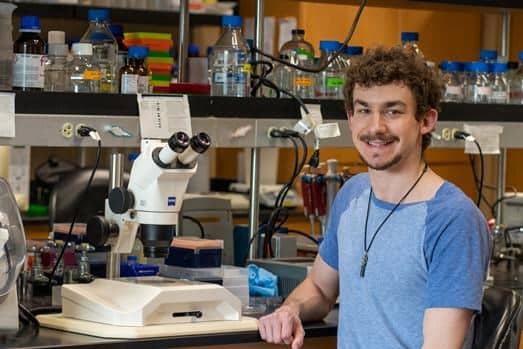
In the fall of 2017, Tristian Wiles ’21 arrived on a college campus more populous than his hometown. That’s probably a more common experience for students attending a flagship state university than for those enrolled at a small liberal arts institution like Hendrix College. But Wiles came from the northeastern Arkansas community of Ash Flat, which has a population of about 1,100.
As a first-generation student from a rural area, Wiles admits to being uncertain about whether he would be a good fit for college life. “But from the friendly housekeepers and caf workers to my dependable professors, everyone has always made me feel at home in the Hendrix community,” he says.
It’s evident that Wiles feels at home at Hendrix (a feeling so common among students that the campus has earned the name Homedrix). He’s excelled as a biochemistry/molecular biology (BCMB) major and added a philosophy minor to his academic pursuits. Outside of classes and labs, he has participated in the BCMB Club, the Hendrix chapter of the American Chemical Society, and Hendrix Naturalists Club. And drawing on his experience as a first-generation college student, Wiles connects with students following paths similar to his own by serving as a mentor for the IRIS Program: Increasing Retention and Inclusion in STEM.
This spring, he learned he’d been accepted into three summer research programs—at Yale, Duke, and UT Southwestern, all programs affiliated with the Amgen Scholars Program (funded by the Amgen Foundation, the principal channel for biotech company Amgen’s corporate philanthropy). He ultimately chose Yale, and was waiting to be matched with a research lab there when he learned that this summer’s program would be canceled because of the coronavirus pandemic. He will be able to attend in the summer of 2021, though.
“Because of that delay, I still don’t know exactly what I’ll study, but it will be some type of biomedical science, likely to do with genetics and molecular biology,” he said.
By that time, Wiles will have his Hendrix degree, and plans to move on to pursue a Ph.D. in the biomedical sciences. His ultimate goal: teaching and conducting research at the college and university level. It’s one way he plans to pay forward the benefits of his own Hendrix education.
“I have found such a strong academic support group at Hendrix,” he says. “I would never have gained the qualifications for these programs without the help of my research advisors, and I certainly could not have written the essays necessary for strong applications without the guidance of my humanities professors and scholarship advisors.”
Wiles believes in the power of making research opportunities available to undergraduate students because he has benefited from it himself.
“I was able to start doing research as early as the end of my freshman year, and completed three projects by the time I was a junior. I started with research in ecology, and, thanks to the guidance of my research advisors, I had homed in on my passion for molecular biology by the end of my third project,” he says. “Hendrix opens so many doors for students interested in undergraduate scientific research.”
Text courtesy of Hendrix College Media Relations Team. To view the original article, please visit https://www.hendrix.edu/tristian-wiles-2020.aspx
Founded in 1978, the Council on Undergraduate Research (CUR) focuses on providing high-quality and collaborative undergraduate research, scholarly, and creative activity. Among the many activities and networking opportunities that CUR provides, the organization also offers support for the professional growth of faculty and administrators through expert-designed institutes, conferences, and a wide-range of volunteer positions. The CUR community, made up of nearly 700 institutions and 13,000 individuals, continues to provide a platform for discussion and other resources related to mentoring, connecting, and creating relationships centered around undergraduate research. CUR’s advocacy efforts are also a large portion of its work as they strive to strengthen support for undergraduate research. Its continued growth in connections with representatives, private foundations, government agencies, and campuses world-wide provides value to its members and gives voice to undergraduate research. CUR is committed to inclusivity and diversity in all of its activities and our community.
CUR focuses on giving a voice to undergraduate research with learning through doing. It provides connections to a multitude of campuses and government agencies, all while promoting networking and professional growth to its community.


